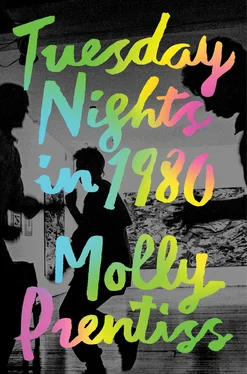Molly Prentiss
Tuesday Nights in 1980
FOR FRANCA.
AND FOR MY FAMILIES, ALL OF THEM,
YOU KNOW WHO YOU ARE.
A man’s work is nothing but the slow trek to rediscover, through the detours of art, those two or three great and simple images in whose presence his heart first opened.
— ALBERT CAMUS
What is a work of art if not the gaze of another person?
— KARL OVE KNAUSGAARD
PROLOGUE. EATING CAKE UNDERGROUND
Buenos Aires, Argentina
September 1980
The meetings happen on Tuesdays, in the basement of Café Crocodile. They’re at six o’clock sharp. To get there in time, Franca Engales Morales has to close up the bakery early. She has just under an hour to finish up the last cake, mop the floors, pull the grate. She’s hurrying, tossing the cake’s thick yellow batter with her big wooden spoon, blowing her bangs from her eyes. She swipes a finger in, licks it, decides to add poppy seeds, dumps in a generous sprinkle. Pulls her favorite Bundt pan — the red one with the scalloped edges — works a slab of butter up the sides with her fingers. Then she pours in a layer of the yellow mix, which settles like mud. A layer of brown sugar and cinnamon, and then another layer of batter. Thirty-five minutes for the cake to bake, then she’ll tuck a sheet of foil around its plate. She’ll step out into what’s left of the winter and there will be a pang in her chest as she clicks closed the oversize lock on the grate. She’ll lose customers from closing early, she knows. And she can’t afford to, she knows. But what are a few customers against the rest of it? Against what will be lost if she doesn’t go to the meetings at all?
What Franca does is bake cakes, and how she does it is well. She bakes quickly and efficiently, and she makes sure the cakes taste good. But here is the thing that is difficult about baking cakes: it doesn’t mean much, in the grand scheme of things. Franca has grappled with this since she began working at the bakery, when she was only seventeen — the year her parents died and she and her brother had been forced to get jobs. Now she is thirty-two and she runs the place and she still can’t help thinking that making cakes for people with extra money to spend on cakes is not necessarily the life that she was meant for. She can’t help thinking she was meant to think just a little bit more.
Here is the thing that is difficult about thinking: this is Buenos Aires, and right now Buenos Aires does not care too much for thinking. In fact, it is as if there is a ban on thinking altogether; if you think too much you might very well never think again. You watch what you think, and you watch what you say out loud. You even watch what you wear and how you walk. When you want to think, you do it in your bed at night, lying there and watching the ceiling fan, hoping no one can hear your thoughts through the thin white curtains that separate you from the perils of the outside world.
“You’re quite an idiot,” is what Franca’s friend Ines told her when she found out about the Tuesday meetings. “If something happens to you? Dear god I pray for Julian.”
But Ines is the kind of friend Franca cannot let herself listen to. If Franca had listened to Ines, she never would have had Julian in the first place. “Who would want to bring a kid into this shit hole?” Ines had said before she knew Franca was pregnant — almost seven years ago now. Ines had already had three children, but she’d had them under Perón. “A whole different time,” Ines promised. “And now? Chaos.”
Yes, it had been chaotic then — Perón, during his second, tumultuous term, had just kicked the bucket and left his incompetent second wife in charge; rumors of a coup had surfaced and spread. Franca’s personal life had felt similarly precarious: her brother, whom she had lived with in her parents’ house since they died more than fifteen years ago, openly detested the man she had chosen to bring into the house and marry, and had finally owned up to his threat, cashing in on his American passport — just another of the things he possessed that she didn’t — and abandoning her for New York City. He claimed he was leaving to pursue painting, but she knew the truth because she felt it, too: he couldn’t stand to share their dead parents’ house with Pascal, or even to be in the house at all; it had become three stories of sadness. He had dragged something sharp through her heart when he went; Raul’s presence was like electricity, lighting up her world when it flicked on for her, darkening everything when it was shut off. It was dark when he left, and she was alone in that dark with Pascal.
She had loved Pascal, she had. With his straight back and his curved lip and his solemn promise that he would take care of her (for an orphan this was the only promise). He was a good man, and by all logical accounts he had seemed like the right choice. But it was when her brother left that she realized that Pascal’s love — easy, dependable, just-fine love — was not enough. Her whole being yearned for Raul: her brother who filled the house with turpentine smell and covered the walls with his paintings; her brother who could look at her eyes and know exactly what was in her heart. She craved the closeness, the almost too -closeness, of real family, a comforting, suffocating closeness that could not be replaced. The paintings he’d left up on the walls only reminded her of his absence, and so she took them down, shoving them under beds or rolling them up to lean in corners. She began to have fantasies about packing a bag and taking Pascal’s stash of cash from the pantry to buy a ticket to New York. But she didn’t have a passport, and it was nearly impossible to get one these days, and the walls were lonely and closing in on her, and so she developed a new fantasy: a tiny baby, a little boy, a companion who sat and drank pear juice with her in the sun. The week after Raul left, Franca crept toward her husband in the middle of the night, and through his bleary state of half sleep, with the moon coming in, with her on top like a madwoman, Franca made herself pregnant. (That was how she thought of it, her making herself pregnant; Pascal, in true Pascal form, was rather passive in the act.)
After Julian was born, the distance between Franca and Pascal only grew wider. Franca spent her days lost in the little human she’d made, gazing into his wide, curious eyes, petting his swish of dark hair, feeding him from her breast, which felt simultaneously painful and satisfying. She was happy only when the baby was in her arms; the baby understood her; the baby reminded her, incredibly, of her brother. The thought of Pascal sitting in his big chair in the living room — his whiskers sticking themselves out of his face, his face sticking itself out of its collar, his hand sticking itself down his pants to itch — began to disgust Franca, and she avoided him altogether, resisted his every touch. They moved into separate rooms. When they spoke, they yelled. And then one morning in April, Franca woke up, breathed in, and understood before she got up from bed that Pascal was not in the house. That he had left her and Julian and would not come back. It was that very day that she’d gone to Café Crocodile for the first time. She’d needed to feel surrounded. She’d needed to feel smaller than something.
So no, she would not listen to Ines, who warned her with a furrowed brow that these meetings were gonna get her scooped up — the term people were using for the mysterious kidnappings that had been happening daily, all over the city, since the coup. Because the meetings remind her every time that she is not the only one who has lost something, that this is a city full of losses, a world full. And because the people at the meetings — young Lara, funny Mateo, serious Sergio, brave Wafa — are, aside from six-year-old Julian, the only family she has.
Читать дальше












